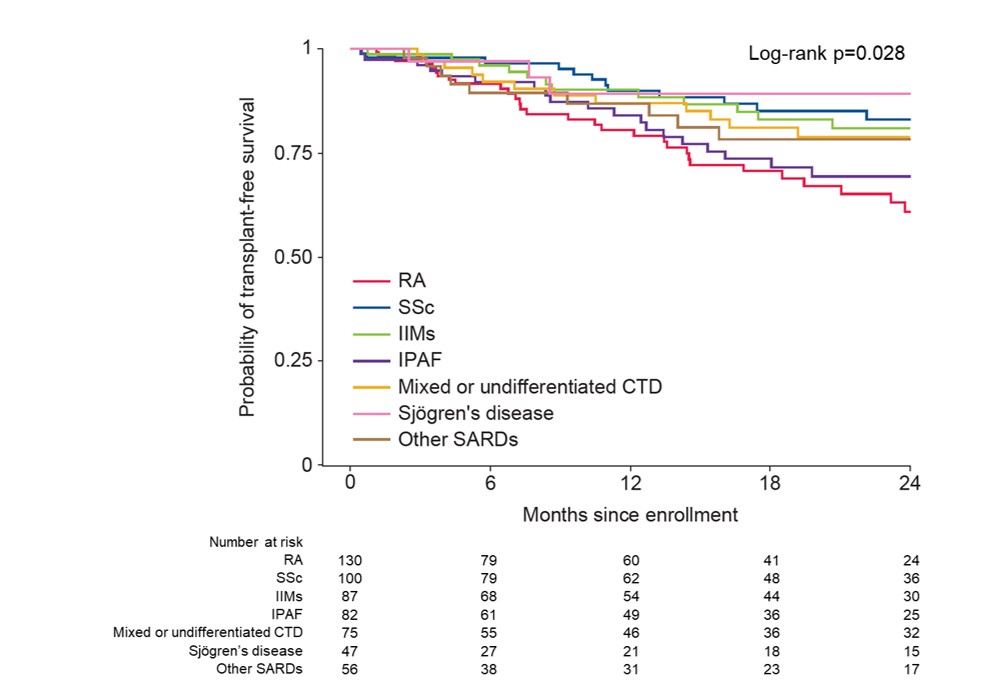Session Information
Date: Sunday, October 26, 2025
Title: (0233–0279) Miscellaneous Rheumatic & Inflammatory Diseases Poster I
Session Type: Poster Session A
Session Time: 10:30AM-12:30PM
Background/Purpose: Progressive pulmonary fibrosis (PPF) is known to be associated with high mortality, but there are few data on the course of PPF in patients with interstitial lung disease (ILD) due to systemic autoimmune rheumatic diseases (SARDs). We evaluated time to death or lung transplant among patients with SARDs and PPF.
Methods: The ILD-PRO Registry enrolled patients who had an ILD other than idiopathic pulmonary fibrosis, reticular abnormality and traction bronchiectasis (with or without honeycombing) on HRCT, and met criteria for ILD progression within the prior 24 months. Patients were followed prospectively while receiving usual care. The Kaplan–Meier method was used to analyze time to death or lung transplant over 24 months in patients with the following SARDs: rheumatoid arthritis (RA), systemic sclerosis (SSc), idiopathic inflammatory myopathies (IIMs), interstitial pneumonia with autoimmune features (IPAF), mixed or undifferentiated connective tissue disease (CTD), Sjögren’s disease, and other SARDs.
Results: A total of 577 patients in the ILD-PRO Registry had SARDs: 130 (22.5%) RA, 100 (17.3%) SSc, 87 (15.1%) IIMs, 82 (14.2%) IPAF, 75 (13.0%) mixed or undifferentiated CTD, 47 (8.1%) Sjögren’s disease, and 56 (9.7%) other SARDs. Patient characteristics at enrollment are summarized in the Table. The probability of transplant-free survival at 24 months was 60.8% for RA, 83.0% for SSc, 80.9% for IIMs, 69.3% for IPAF, 78.8% for mixed or undifferentiated CTD, 89.2% for Sjögren’s disease and 78.2% for other SARDs (Figure).
Conclusion: Patients with SARDs and PPF enrolled in the ILD-PRO Registry had a high probability of death or lung transplant over the following two years. The probability of transplant-free survival varied by type of SARD, with the worst survival in patients with RA and IPAF.
 Figure. Kaplan-Meier estimate of time to death or lung transplant among patients with SARDs and PPF in the ILD-PRO Registry.
Figure. Kaplan-Meier estimate of time to death or lung transplant among patients with SARDs and PPF in the ILD-PRO Registry.
.jpg) Table. Characteristics of patients with SARDs and PPF at enrollment in the ILD-PRO Registry
Table. Characteristics of patients with SARDs and PPF at enrollment in the ILD-PRO Registry
To cite this abstract in AMA style:
Bracken S, Swaminathan A, Weber J, Neely M, Palmer S, Wilfong E, Chauffe A, Volkmann E. Transplant-free survival in patients with systemic autoimmune rheumatic diseases and progressive pulmonary fibrosis in the ILD-PRO Registry [abstract]. Arthritis Rheumatol. 2025; 77 (suppl 9). https://acrabstracts.org/abstract/transplant-free-survival-in-patients-with-systemic-autoimmune-rheumatic-diseases-and-progressive-pulmonary-fibrosis-in-the-ild-pro-registry/. Accessed .« Back to ACR Convergence 2025
ACR Meeting Abstracts - https://acrabstracts.org/abstract/transplant-free-survival-in-patients-with-systemic-autoimmune-rheumatic-diseases-and-progressive-pulmonary-fibrosis-in-the-ild-pro-registry/
